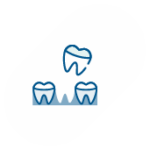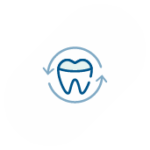Post operative instructions
Implant surgery
Instructions for the care of your mouth after undergoing implant surgery.
You have had an implant/implants placed in your mouth. The implants have been placed into your jawbone and require time to integrate - become fused to the bone and ready to carry the load of chewing on them once they are restored.
Be Gentle
ln order to give your implant the optimal conditions for integration it is important to avoid moving the implant by causing it to be knocked or bumped in anyway, therefore avoid deliberately pressing the implant with your finger or tongue or chewing on it. Food is best chewed away from the site of the implant when possible.
Sutures
There will be resorbable (self-dissolving) stitches which may take up to two weeks to dissolve. It helps if you rinse your mouth with a salt water solution for the first week of healing. To do this mix a cup of warm water with a teaspoon of salt (normal table salt) and gently rinse this around your mouth allowing the salt solution to pool in the area of the implant for a few minutes - do this twice per day starting 24 hours after the implant surgery.
Diet
After implant surgery - it is advised to keep chewing to a minimum for the first week after surgery - keep away from foods which include seeds or nuts and keep the diet as soft as possible to minimise chewing.
You may experience pain during the healing process - this is not usually very severe and can be controlled with regular paracetamol and ibuprofen. Sometimes your surgeon will prescribe a stronger painkiller to take as well.
Toothbrushing
You can brush the other teeth in your mouth as normal - don't brush the implant or the area immediately adjacent to it.
Antibiotics
Are not routinely prescribed after implant surgery but your surgeon may choose sometimes to prescribe a course of antibiotics if there are special circumstances.
Review appointment
An appointment will be made to check that the tissues are healing properly and that the implant is integrating.
At two to three months after implant placement the surgeon will see you again to test the implant and to determine if it has integrated and is now ready for loading - moving on to the restorative part of your treatment. An X-ray will be taken before or during this visit to determine the bone quality around the implant. The surgeon will carry out a small test on the implant to determine its level of integration into the jawbone.
ln most cases the implant will have successfully integrated, and you will be referred back to your dentist or prosthodontist for the restoration of the implant at this stage but occasionally an implant will be determined to have failed and will have to be removed because it hasn't achieved full stability. ln this situation the surgeon will discuss the possibility of replacing the implant with a new one following a delay to allow for adequate healing of the bone. Such surgery will be carried out at minimal cost (to cover the cost of the consumables and time) but implant hardware costs will not be charged.
Once the implant is restored it will normally give many years of good service, there is a need to keep up regular checks with your dentist and to follow advice on the ongoing care of your implant and crown / bridge / denture.
It is possible (but very rare) for an implant to fail (become loose) after years of service. If this happens you will be referred back to your surgeon for investigation of what caused the failure and to look into placing a new implant - there may be some additional cost for this depending on circumstances but in general if an implant has been functional for up to three years, it will be replaced without charge for the hardware cost of the implant componentry (but there will still be a minimal charge for the use of consumables and time). lf an implant fails after 3 years of service the replacement costs may be passed on to you in full.









